With Ethiopia on the brink, Canada warns citizens to leave immediately

The government of Canada is advising all Canadians in Ethiopia to leave the country immediately.
The advisory came just days after Prime Minister Justin Trudeau called his Ethiopian counterpart Abiy Ahmed — one of several calls Ethiopia's prime minister has had to field lately from foreign leaders concerned about the fate of the world's twelfth most populous nation.
"I underscored the need for an immediate cessation of hostilities, increased humanitarian access on an urgent basis and meaningful dialogue towards a peaceful resolution," Trudeau said.
But foreign admonitions seem increasingly irrelevant to a government that believes itself to be in an existential struggle.
Earlier this month, Abiy Ahmed called on Ethiopian civilians of fighting age to head to the front — then 270 kilometres from the capital Addis Ababa — to do battle to save the nation. This week, with the front about 50 kilometres closer, he announced that he was heading there himself, leaving his deputy PM in charge.
An African Union mission has arrived in the country to try to broker a peace deal that would require concessions neither side seems willing to make.
Today, Trudeau was on the phone again with the African Union's representative for the region, former Nigerian president Olusegun Obasanjo. According to a readout of the call, he expressed "Canada's strong and ongoing commitment to supporting efforts to bring a peaceful resolution to the conflict."
For now, though, both sides are committed to a military solution and the guns are doing the talking.
Canada heavily invested
Since 2000, Ethiopia has received more Canadian development assistance — just over $3 billion — than any nation other than Afghanistan. Ethiopia moved into the top spot among recipients of Canadian aid in 2012 and has held first or second place every year since.
Ethiopia put its foreign aid to good use and has prospered in recent years.
Trudeau's last overseas trip before the pandemic hit included a visit to Abiy Ahmed, then riding high on economic growth and a Nobel Peace Prize.
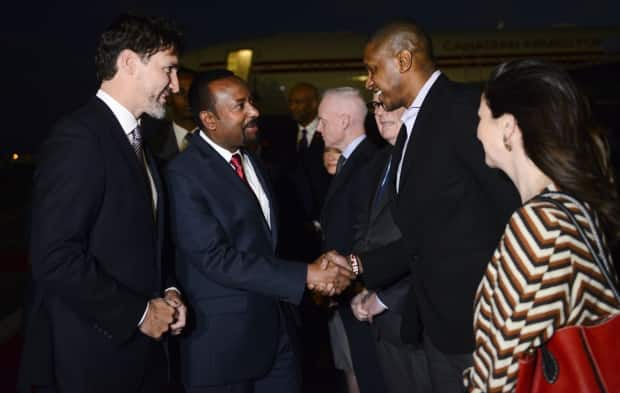
On the rooftop of the Effoi Pizza restaurant in Addis Ababa on February 9, 2020, flanked by Toronto Raptors president Masai Ujiri, and federal cabinet ministers Ahmed Hussen and Mary Ng, Trudeau expressed optimism about Ethiopia's prospects.
"You don't have to look too far to see the future is bright," he said, praising Abiy and announcing plans to co-host "a clean tech conference in Addis next year."
"The exciting conversation we're having in this unbelievably growing country is around investments, is around entrepreneurship, is around greater trade ties, is around partnership."
Neither the Trudeau government nor most Ethiopians anticipated the war that would come less than nine months later.
Taking distance
Lately, there's been less investing and more imploring from Canada.
"In direct discussions with Ethiopian officials, in consultations with like-minded partners and through public statements, Canada has impressed on all parties to the Ethiopian conflict to immediately cease hostilities, pursue a peaceful resolution to the ongoing crisis, uphold human rights and ensure unhindered humanitarian access and delivery of humanitarian assistance to those affected by the conflict," said Grantly Franklin, spokesperson for Global Affairs Canada.
The message that "our government is working with Ethiopia," as Trudeau announced in Addis last year, is gone.
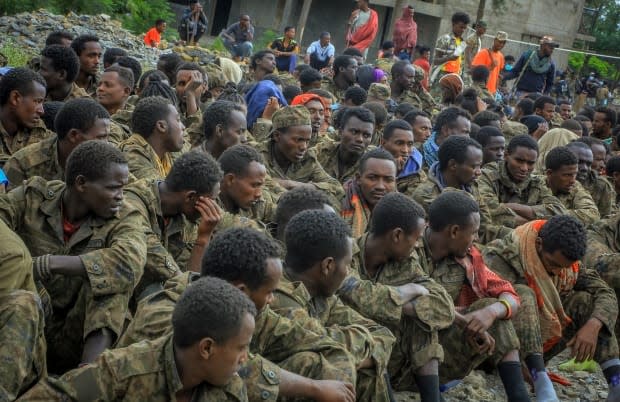
"Please note that Canada has no operational involvement or training/cooperation with the Ethiopian armed forces. Canada also does not provide direct budgetary support to the Government of Ethiopia," said Franklin.
Funds have been redirected, he said, to "humanitarian assistance funding to UN, Red Cross and NGO partners to address life-saving needs." Canada has redirected $43 million of Ethiopia's aid envelope to humanitarian assistance so far this year.
Western pressure called 'hypocritical'
Ann Fitz-Gerald lived and worked for many years in Ethiopia and today heads the Balsillie School of International Affairs at Wilfred Laurier University.
She said Trudeau has been more reluctant to condemn Abiy than either the administration of U.S. President Joe Biden or the European Union.
"He talked about a peaceful resolution and a political settlement through dialogue," she said. "This differs significantly from some of the calls elsewhere that have used the words 'negotiations without preconditions.'"
Fitz-Gerald said it's hypocritical of western governments to call on a democratically-elected government to negotiate.
"The U.S. government has no intention of negotiating with the insurrectionists who stormed Capitol Hill after the U.S. election," she told CBC News. "No civilized, democratic, legitimate government would do that."
'Both-sides-ism'
But Tigrayan-Canadians say the Trudeau government has been too accommodating of the Abiy government, despite well-documented abuses by the Ethiopian Army and its Eritrean allies, including the rape of Tigrayan women.
"Honestly I'm disappointed by Mr. Trudeau's approach and the Canadian government's approach," said Tesfay Teklay of the Association of Tigrayan Communities in Canada. "It didn't live up to its ideals of standing up for human rights.
"There is this both-sides-ism, assigning blame equally on the perpetrator and on the victim, the victim that is defending itself, and a perpetrator that is hell-bent on cleansing an entire ethnic group."
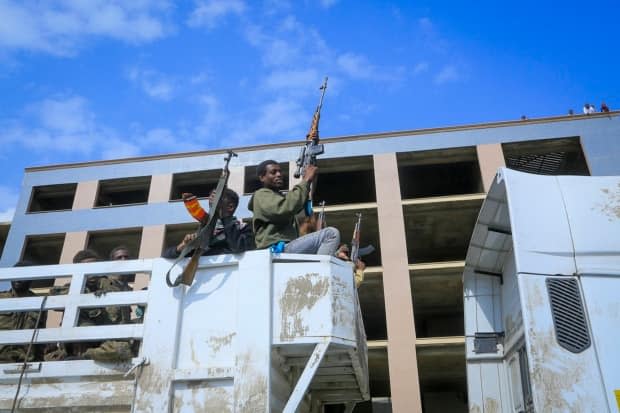
The Ethiopian government only permitted the UN to probe those reports of abuse by Ethiopian soldiers in collaboration with its own human rights agency. The joint report that resulted, Tesfay said, "allowed the Ethiopian government to investigate itself."
Canada was one of 15 western countries that accepted that report this month, calling the violence it attributed to both sides "appalling, deeply disturbing and completely unacceptable."
Independent sources have also documented massacres of civilians by Tigrayan forces.
Losing hearts and minds
In addition to reverses on the battlefield, the Ethiopian government has suffered defeats in diplomacy and the battle for international public opinion.
Fitz-Gerald said Abiy's government was outmaneuvered.
"I suspect that has to do with the fact that the government was caught totally off guard by a surprise attack, and also the fact that it's a relatively new, young, inexperienced administration," she said.
"They were fighting wolves at the door and trying to counter this overwhelming narrative that was coming to the global community from the propaganda network."
Ethiopian government supporters say they see sinister motives behind the lack of support from the West. This week, Abiy described the war as a "conspiracy to place a new colonial yoke on Ethiopia."
Fitz-Gerald said two western nations, Canada and Italy, have been more supportive than most.
Nevertheless, the Abiy government recently disconnected the telephones and closed the doors at its embassy in Ottawa. Ambassador Nasise Challi returned to Addis and was named minister of tourism — just as other countries were warning their citizens not to visit Ethiopia.
Ethiopia has closed 30 embassies in recent months.
"They're spending billions of dollars to finance this war machine," said Tesfay. "I'm surprised the country didn't collapse a few months ago."
Fitz-Gerald said she believes PM Abiy may send a new ambassador to Canada shortly.
Global Affairs' advisory asking Canadians to leave Addis suggests doubts about whether Abiy's government will even survive.
A major, but mostly invisible, war
Though fought largely out of view of cameras, there is nothing small-scale or low-tech about the civil war in Ethiopia. It's being fought with modern combat aircraft, tanks and artillery, ballistic missiles and state-of-the-art drones.
Hunger also has been deployed as a weapon — so far mostly against Tigray. The Ethiopian and Eritrean armies burned crops there and then blocked food aid from entering.
But the front has moved and the battles being fought now will decide who controls the highways that connect the Ethiopian capital and heartland to the outside world.
It is this threat of blockade, more than any immediate prospect of his government's collapse, that seems to have driven Abiy Ahmed to take personal command.
Aiming for Addis
Tigrayan forces say they have no intention of governing Ethiopia, as they did for three decades prior to the arrival of Abiy Ahmed.
"The first goal is to bring the criminals to justice and hold them accountable," said Tesfay. "That's the first goal of the advance to Addis Ababa. The second is to silence the guns. They have the air power, they have the drones and they are coordinating their attacks from Addis Ababa."
Tesfay said Tigrayan forces are not looking to besiege or starve the Ethiopian heartland, but rather to break the blockade the central government has imposed on a starving Tigray.
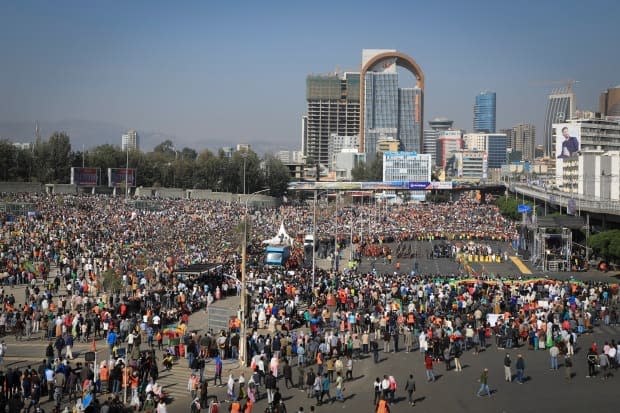
"They have a chokehold. They control the banks, they control the money, the electricity, telecommunications, everything," he said. "So we are completely under siege, one hundred per cent and 360 degrees. [Tigrayan forces] have to break the siege so that humanitarian aid can flow in."
But the Tigrayan leadership also makes no secret of its plan to depose the Abiy government and replace it with one that can ratify a partition of Ethiopia.
No easy victories
There are few signs of a swift victory for either side. Tigrayan forces have advanced and are forming new alliances with other disaffected groups in the country.
But as they move farther from their homeland, they go deeper into territory where they have no popular support.
The Ethiopian army appears to have been severely degraded over the last few months. But Fitz-Gerald says the Abiy government retains popular support in most of Ethiopia.
"Let's not forget that out of those eligible to vote in the recent election, approximately 80 per cent voted. That is an outcome that countries across the West would crave," she said.
The vote was a strong endorsement of Abiy's mandate. Recent days have seen a surge of rally-round-the-flag sentiment, with national celebrities volunteering for frontline service.
Treated like foreigners
Tigrayan feelings have also hardened. "The last year has been hell," said Tesfay.
The bonds of shared pride in Ethiopia's ancient civilization, and in its legacy as the only African nation to successfully resist European colonization, have been frayed by a government that has treated Tigrayans "as if we are a foreign people, as if we don't belong to Ethiopia," he said.
"Our own army, that's supposed to be protecting us, has allied with a foreign power against us."
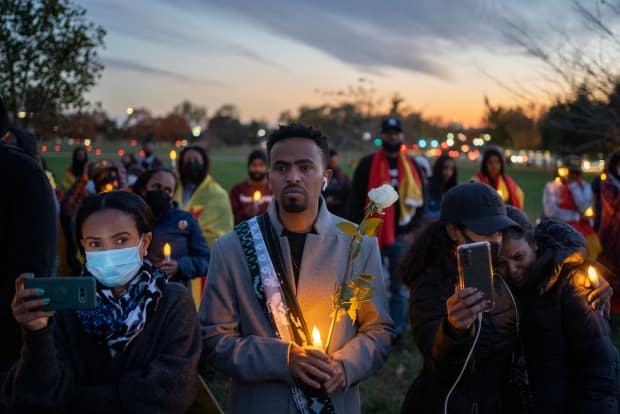
Tesfay said that in retreat, the Ethiopian government has turned to persecuting ethnic Tigrayans in parts of the country it still controls, including his own family in Addis.
"My brother-in-law has been arrested. He used to be an officer in the federal army. Just because he's Tigrayan, he's been under house arrest for a year," he said. "A couple of weeks ago they came in the middle of the night and took him, in front of his wife and his child, and we don't know where he is now."
The solution, he said, is a referendum on separation.
"If you had asked the question one year ago, the people of Tigray would tell you we don't want independence," he said. "Now, things have completely changed."
Fitz-Gerald said other countries should try to prevent the disintegration of the Federal Democratic Republic of Ethiopia.
"I think that the survival and integrity of Ethiopia as a country will only be threatened if the international community does not support a legitimate and democratic government," she said.
"If countries continue to call for Abiy to negotiate, they're pushing him into a corner. If he does that, he will lose the people of Ethiopia who voted for him."

